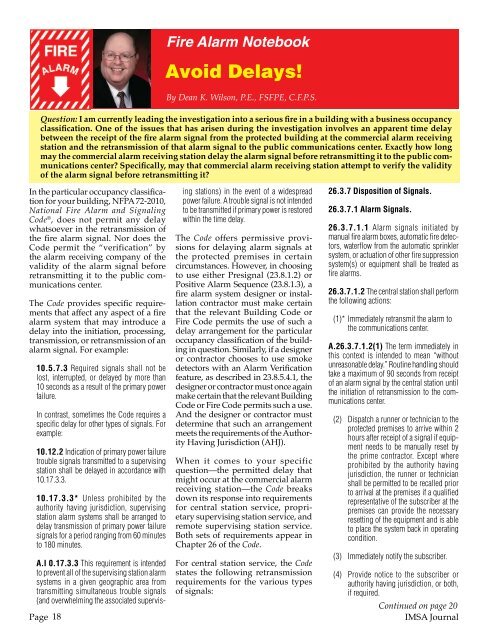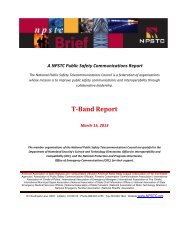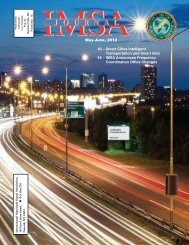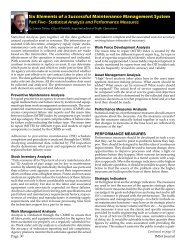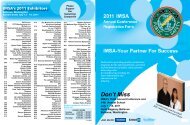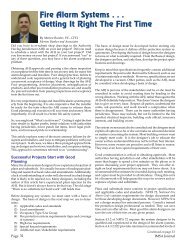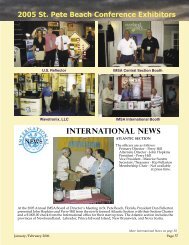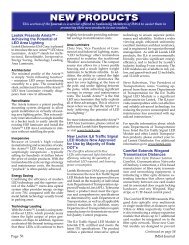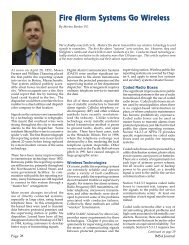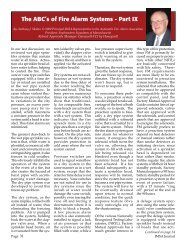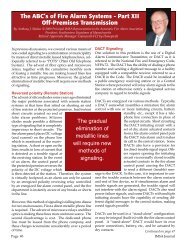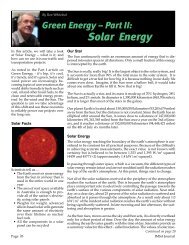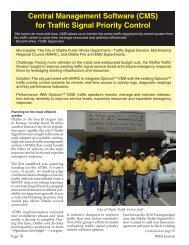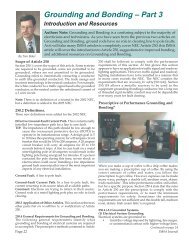Fire Alarm Notebook - Avoid Delays - IMSA
Fire Alarm Notebook - Avoid Delays - IMSA
Fire Alarm Notebook - Avoid Delays - IMSA
You also want an ePaper? Increase the reach of your titles
YUMPU automatically turns print PDFs into web optimized ePapers that Google loves.
<strong>Fire</strong> <strong>Alarm</strong> <strong>Notebook</strong><strong>Avoid</strong> <strong>Delays</strong>!By Dean K. Wilson, P.E., FSFPE, C.F.P.S.Question: I am currently leading the investigation into a serious fire in a building with a business occupancyclassification. One of the issues that has arisen during the investigation involves an apparent time delaybetween the receipt of the fire alarm signal from the protected building at the commercial alarm receivingstation and the retransmission of that alarm signal to the public communications center. Exactly how longmay the commercial alarm receiving station delay the alarm signal before retransmitting it to the public communicationscenter? Specifically, may that commercial alarm receiving station attempt to verify the validityof the alarm signal before retransmitting it?In the particular occupancy classificationfor your building, NFPA 72-2010,National <strong>Fire</strong> <strong>Alarm</strong> and SignalingCode ® , does not permit any delaywhatsoever in the retransmission ofthe fire alarm signal. Nor does theCode permit the “verification” bythe alarm receiving company of thevalidity of the alarm signal beforeretransmitting it to the public communicationscenter.The Code provides specific requirementsthat affect any aspect of a firealarm system that may introduce adelay into the initiation, processing,transmission, or retransmission of analarm signal. For example:10.5.7.3 Required signals shall not belost, interrupted, or delayed by more than10 seconds as a result of the primary powerfailure.In contrast, sometimes the Code requires aspecific delay for other types of signals. Forexample:10.12.2 Indication of primary power failuretrouble signals transmitted to a supervisingstation shall be delayed in accordance with10.17.3.3.10.17.3.3* Unless prohibited by theauthority having jurisdiction, supervisingstation alarm systems shall be arranged todelay transmission of primary power failuresignals for a period ranging from 60 minutesto 180 minutes.Page 18A.I 0.17.3.3 This requirement is intendedto prevent all of the supervising station alarmsystems in a given geographic area fromtransmitting simultaneous trouble signals(and overwhelming the associated supervisingstations) in the event of a widespreadpower failure. A trouble signal is not intendedto be transmitted if primary power is restoredwithin the time delay.The Code offers permissive provisionsfor delaying alarm signals atthe protected premises in certaincircumstances. However, in choosingto use either Presignal (23.8.1.2) orPositive <strong>Alarm</strong> Sequence (23.8.1.3), afire alarm system designer or installationcontractor must make certainthat the relevant Building Code or<strong>Fire</strong> Code permits the use of such adelay arrangement for the particularoccupancy classification of the buildingin question. Similarly, if a designeror contractor chooses to use smokedetectors with an <strong>Alarm</strong> Verificationfeature, as described in 23.8.5.4.1, thedesigner or contractor must once againmake certain that the relevant BuildingCode or <strong>Fire</strong> Code permits such a use.And the designer or contractor mustdetermine that such an arrangementmeets the requirements of the AuthorityHaving Jurisdiction (AHJ).When it comes to your specificquestion—the permitted delay thatmight occur at the commercial alarmreceiving station—the Code breaksdown its response into requirementsfor central station service, proprietarysupervising station service, andremote supervising station service.Both sets of requirements appear inChapter 26 of the Code.For central station service, the Codestates the following retransmissionrequirements for the various typesof signals:26.3.7 Disposition of Signals.26.3.7.1 <strong>Alarm</strong> Signals.26.3.7.1.1 <strong>Alarm</strong> signals initiated bymanual fire alarm boxes, automatic fire detectors,waterflow from the automatic sprinklersystem, or actuation of other fire suppressionsystem(s) or equipment shall be treated asfire alarms.26.3.7.1.2 The central station shall performthe following actions:(1)* Immediately retransmit the alarm tothe communications center.A.26.3.7.1.2(1) The term immediately inthis context is intended to mean “withoutunreasonable delay.” Routine handling shouldtake a maximum of 90 seconds from receiptof an alarm signal by the central station untilthe initiation of retransmission to the communicationscenter.(2) Dispatch a runner or technician to theprotected premises to arrive within 2hours after receipt of a signal if equipmentneeds to be manually reset bythe prime contractor. Except whereprohibited by the authority havingjurisdiction, the runner or technicianshall be permitted to be recalled priorto arrival at the premises if a qualifiedrepresentative of the subscriber at thepremises can provide the necessaryresetting of the equipment and is ableto place the system back in operatingcondition.(3) Immediately notify the subscriber.(4) Provide notice to the subscriber orauthority having jurisdiction, or both,if required.Continued on page 20<strong>IMSA</strong> Journal
<strong>Fire</strong> <strong>Alarm</strong> <strong>Notebook</strong> . . .Exception: If the alarm signal results froma prearranged test, the actions specified by26.3.7.1.2(1) and (3) shall not be required.26.3.7.2 Guard’s Tour SupervisorySignal.26.3.7.2.1 Upon failure to receive a guard’stour supervisory signal within a 15-minutemaximum grace period, the central stationshall perform the following actions:(1) Communicate without unreasonabledelay with personnel at the protectedpremises(2) Dispatch a runner to the protectedpremises to arrive within 30 minutesof the delinquency if communicationscannot be established(3) Report all delinquencies to the subscriberor authority having jurisdiction,or both, if required26.3.7.2.2 Failure of the guard to follow aprescribed route in transmitting signals shallbe handled as a delinquency.26.3.7.3* Supervisory Signals. Upon receiptof a supervisory signal from a sprinklersystem, other fire suppression system (s),or other equipment, the central station shallperform the following actions:A.26.3.7.3 It is anticipated that the centralstation will first attempt to notify designatedpersonnel at the protected premises. Whensuch notification cannot be made, it mightbe appropriate to notify law enforcement orthe fire department, or both. For example, ifa valve supervisory signal is received whereprotected premises are not occupied, it isappropriate to notify the police.(1)* Communicate immediately with thepersons designated by the subscriberand notify the fire department or lawenforcement agency, or both, whenrequired by the authority having jurisdictionA.26.3.7.3(1) The term immediately inthis context is intended to mean “withoutunreasonable delay.” Routine handling shouldtake a maximum of 4 minutes from receipt ofa supervisory signal by the central stationuntil the initiation of communications with aperson(s) designated by the subscriber.Page 20Continued from page 18(2) Dispatch a runner or maintenanceperson to arrive within 2 hours toinvestigateException: Where the supervisory signalis cleared in accordance with a scheduledprocedure determined by 26.3.7.3(1).(3) Notify the authority having jurisdictionwhen sprinkler systems or other firesuppression systems or equipmenthave been wholly or partially out ofservice for 8 hours(4) When service has been restored,provide notice, if required, to thesubscriber or the authority havingjurisdiction, or both, as to the natureof the signal, the time of occurrence,and the restoration of service whenequipment has been out of service for8 hours or moreException: If the supervisory signal resultsfrom a prearranged test, the actions specifiedby 26.3. 7.3(1), (3), and (4) shall notbe required.26.3.7.4 Trouble Signals. Upon receiptof trouble signals or other signals pertainingsolely to matters of equipment maintenanceof the alarm systems, the central station shallperform the following actions:(1)* Communicate immediately with personsdesignated by the subscriberA.26.3.7.4(1) The term immediately inthis context is intended to mean “withoutunreasonable delay.” Routine handling shouldtake a maximum of 4 minutes from receipt ofa trouble signal by the central station untilinitiation of the investigation by telephone.(2) Dispatch personnel to arrive within 4hours to initiate maintenance, if necessary(3) When the interruption is more than 8hours, provide notice to the subscriberand the fire department if so requiredby the authority having jurisdiction asto the nature of the interruption, thetime of occurrence, and the restorationof service26.3.7.5 Test Signals.26.3.7.5.1 All test signals received shall berecorded to indicate date, time, and type.26.3.7.5.2 Test signals initiated by thesubscriber, including those for the benefitof an authority having jurisdiction, shall beacknowledged by central station personnelwhenever the subscriber or authorityinquires.26.3.7.5.3* Any test signal not receivedby the central station shall be investigatedimmediately, and action shall be taken toreestablish system integrity.A.26.3.7.5.3 The term immediately inthis context is intended to mean “withoutunreasonable delay.” Routine handling shouldtake a maximum of 4 minutes from receipt ofa trouble signal by the central station untilinitiation of the investigation by telephone.26.3.7.5.4 The central station shall dispatchpersonnel to arrive within 2 hours if protectedpremises equipment needs to be manuallyreset after testing.26.3.7.5.5 The prime contractor shallprovide each of its representatives and eachalarm system user with a unique personalidentification code.26.3.7.5.6 In order to authorize the placingof an alarm system into test status, a representativeof the prime contractor or an alarmsystem user shall first provide the centralstation with his or her personal identificationcode.For proprietary supervising stationservice, the Code states the followingretransmission requirements for thevarious types of signals:26.4.5.6 Dispositions of Signals.26.4.5.6.1 <strong>Alarm</strong>s. Upon receipt of analarm signal, the proprietary supervising stationoperator shall initiate action to performthe following:(1) Immediately notify the fire department,the emergency response team, andsuch other parties as the authorityhaving jurisdiction requires(2) Dispatch a runner or technician to thealarm location to arrive within 2 hoursafter receipt of a signal(3) Restore the system as soon as possibleContinued on page 22<strong>IMSA</strong> Journal
<strong>Fire</strong> <strong>Alarm</strong> <strong>Notebook</strong> . . .Continued from page 20Page 22after disposition of the cause of thealarm signal26.4.5.6.2 Guard’s Tour SupervisorySignal. If a guard’s tour supervisory signal isnot received from a guard within a 15 minutemaximum grace period, or if a guard fails tofollow a prescribed route in transmitting thesignals (where a prescribed route has beenestablished), the proprietary supervising stationoperator shall initiate action to performthe following:(1) Communicate at once with the protectedareas or premises by telephone, radio,calling back over the system circuit, orother means accepted by the authorityhaving jurisdiction(2) Dispatch a runner to arrive within 30minutes to investigate the delinquencyif communications with the guard cannotbe promptly established26.4.5.6.3 Supervisory Signals. Uponreceipt of sprinkler system and other supervisorysignals, the proprietary supervising stationoperator shall initiate action to perform thefollowing, if required:(1) Communicate immediately with thedesignated person(s) to ascertain thereason for the signal(2) Dispatch personnel to arrive within 2hours to investigate, unless supervisoryconditions are promptly restored(3) Notify the fire department if required bythe authority having jurisidiction(4) Notify the authority having jurisdictionwhen sprinkler systems are wholly orpartially out of service for 8 hours ormore(5) Provide written notice to the authorityhaving jurisdiction as to the nature ofthe signal, time of occurrence, andrestoration of service when equipmenthas been out of service for 8 hours ormore26.4.5.6.4 Trouble Signals. Upon receiptof trouble signals or other signals pertainingsolely to matters of equipment maintenanceof the alarm system, the proprietary supervisingstation operator shall initiate action toperform the following, if required:(1) Communicate immediately with thedesignated person(s) to ascertainreason for the signal(2) Dispatch personnel to arrive within 4hours to initiate maintenance, if necessary(3) Notify the fire department if required bythe authority having jurisdiction(4) Notify the authority having jurisdictionwhen interruption of service exists for4 hours or more(5) When equipment has been out ofservice for 8 hours or more, providewritten notice to the authority havingjurisdiction as to the nature of the signal,time of occurrence, and restorationof serviceFor remote supervising station service,the Code states the followingretransmission requirements for thevarious types of signals:26.5.5.1 If the remote supervising station isat a location other than the communicationscenter, alarm signals shall be immediatelyretransmitted to the communications center.26.5.5.2 Upon receipt of an alarm, a supervisory,or a trouble signal by the remote supervisingstation other than the communicationscenter, the operator on duty shall be responsiblefor notifying the owner or the owner’sdesignated representative immediately.As you read through these requirements,you should have noted the frequentuse of the word “immediately”and the attendant explanations fromthe Annex. And you should havediscerned that the Code requires nodelay in the retransmission of the firealarm signal once the central station,proprietary supervising station, orremote supervising station receivesthe signal.Just to present as thorough an answeras possible, even though your buildingwas a property housing a businessoccupancy, in the case of single- andmultiple-station alarms and householdfire alarm systems servingone- and two-family dwellings, theCode does provide this permissiverequirement:29.7.8.2* Remote monitoring stations shallbe permitted to verify alarm signals prior toreporting them to the fire service, providedthat the verification process does not delaythe reporting by more than 90 seconds.The Code expects central station,proprietary, and remote station alarmreceiving facilities to immediatelyretransmit fire alarm signals withoutany delay. In general, the Code doesnot permit the central station, proprietarysupervising station, or theremote supervising station to verifythe validity of the alarm signal beforeretransmitting it to the public communicationscenter. The only exception,as noted above, occurs when thesignal originates from a householdfire alarm system serving a one- ortwo-family dwelling.Thus, in the case of your fire investigation,if you feel that the receivingstation delayed the retransmission ofthe fire alarm signals, you should giveat least some attention to that part ofthe investigation.Delaying the retransmission of firealarm signals does not provide a suitablesolution for alarm systems thatproduce unnecessary alarm signals.Rather, the owner of the propertyneeds to work diligently with qualifiedalarm system service techniciansto resolve all underlying causes forthe unnecessary signals.<strong>IMSA</strong> member Dean K. Wilson, P.E., FSFPE,C.F.P.S., now retired on disability, formerlyworked as a Senior Engineer in the Erie(PA) office of the fire protection engineeringand code consulting firm, Hughes Associates,Inc. (www.haifire.com). The opinionsexpressed in this article are strictly his own.You may reach him by e-mail at:deanwilson@roadrunner.com or by telephoneat 814-397-5558.<strong>IMSA</strong> Journal


